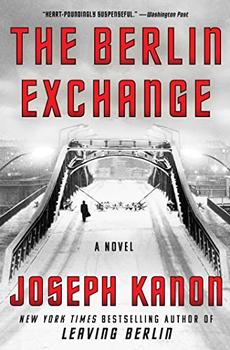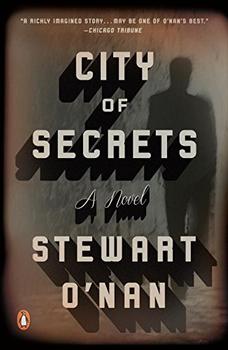Summary | Excerpt | Reviews | Beyond the book | Read-Alikes | Genres & Themes | Author Bio

Have you ever come late to a party thinking you missed most of the fun, only to find out that the best was yet to come? Well, I seem to have come late to John Lawton's party because this is the first book of his that I've read. And it is so good that I will now pick up his previous seven books, all part of the Frederick Troy series. What's more, I look forward to the next installment of this new series, about John Wilfred Holderness, aka Wilderness, aka Joe.
How do I know there will be another Wilderness book? Well, I don't want to get ahead of myself. It's enough just getting to know this brand new character in the annals of post World War II noir fiction. Wilderness is a compelling character, a self-described honest criminal. Most of the book comprises his extensive backstory, which is bookended by a plot about smuggling a person from East to West Berlin in 1963. This plot point is a slender if engaging excuse, one suspects, to present this self-effacing, cocky Cockney who sprouted between the cracks in London's blitzed East End and who grew up happy to be alone in a crowd. In true British fashion, early in his childhood John Wilfred Holderness, saddled with a moniker unbefitting his lower class status, was nicknamed Wilderness. His parents called him John, his RAF chums called him Joe but most of the time he is Wilderness. In truth these background chapters are the ones I like best because Lawton has a real feel for dialect and dialogue. I particularly enjoy his use of the Cockney accent.
When Wilderness was twelve his mum was killed in a bombed pub, her body draped over a glass of gin. His dad was serving in the army so he went to live with his granddad, cracksman and burglar Abner Riley and Merle, Abner's…er…lady friend. The old man taught him the tricks of a cracksman's trade (cracking safes and burglarizing them) and the three of them – Merle, a part-time hooker - made a rather nice, if unostentatious living. By night the brilliant lad would read books of all sorts and by day he and Abner worked their craft. Abner would advise:
"Now…I suppose you think a burglar…"
Abner could no more pronounce burglar than coupon, which always resembled an utterance like 'cyuoopon.'"
…"as a bloke what works at dead of night, like I was on the cover of some penny dreadful, swingin' off the gutters at midnight in a striped jersey wiv a mask over me eyes."
Can't you almost hear Abner's voice? As a quick study, Wilderness took it all in. That is, until the old man died pulling off a job.
When the war ended and he hadn't been drafted, Wilderness figured he was home free. He was wrong. Drafted into the RAF, he was the consummate misfit until Lieutenant Colonel Burne-Jones "saved his bacon" by drafting him into the new sort of warfare required in a Cold War. Wilderness was sent to Berlin to put his brains and his cracksman training to use in service to the Queen.
He went to Berlin alright - used his brains and cracksmanship - some even in service to the Queen. Wilderness and his pals became big time black marketeers - schiebers (see Beyond the Book). And he falls in love with Nell, a "po-faced" young German woman who, despite several months' service at the Bergen-Belsen displaced persons camp, maintains a moral compass the polar opposite of Wilderness's. While Nell's character stretches credulity with her goody two-shoes demeanor, I could overlook it because Wilderness needs a balance to offset his hard-line pragmatism. Also, since she is the first real love in his life I can envision her reappearance in subsequent plotlines where she may have to compromise her strict moral code. Just a guess, mind you.
Like Leonard Cohen's song First We Take Manhattan, the book begins with Wilderness's 1963 visit to Manhattan and an old buddy making a rather suspicious request. However, it seems that unlike the song, Manhattan – via the so-called American buddy - threatens to take Wilderness. The whole tone of the book is a dark and painstakingly researched journey through the morass of some of the twentieth century's most morally ambiguous years. It ends in Berlin – it's no spoiler to say that Wilderness does take Berlin - where the crazy wicked final chapter took my breath away.
Bring on more Lawton! I have a feeling the party's just begun.
![]() This review was originally published in The BookBrowse Review in October 2013, and has been updated for the
November 2014 edition.
Click here to go to this issue.
This review was originally published in The BookBrowse Review in October 2013, and has been updated for the
November 2014 edition.
Click here to go to this issue.

If you liked Then We Take Berlin, try these:

by Joseph Kanon
Published 2023
From "master of the genre" (the Washington Post) Joseph Kanon, an espionage thriller set at the height of the Cold War, when a captured American who has spied for the KGB is swapped by the British and returns to East Berlin needing to know who arranged his release and what they want from him.

by Stewart O'Nan
Published 2017
From master storyteller Stewart O'Nan, a timely moral thriller of the Jewish underground resistance in Jerusalem after the Second World War
Your guide toexceptional books
BookBrowse seeks out and recommends the best in contemporary fiction and nonfiction—books that not only engage and entertain but also deepen our understanding of ourselves and the world around us.